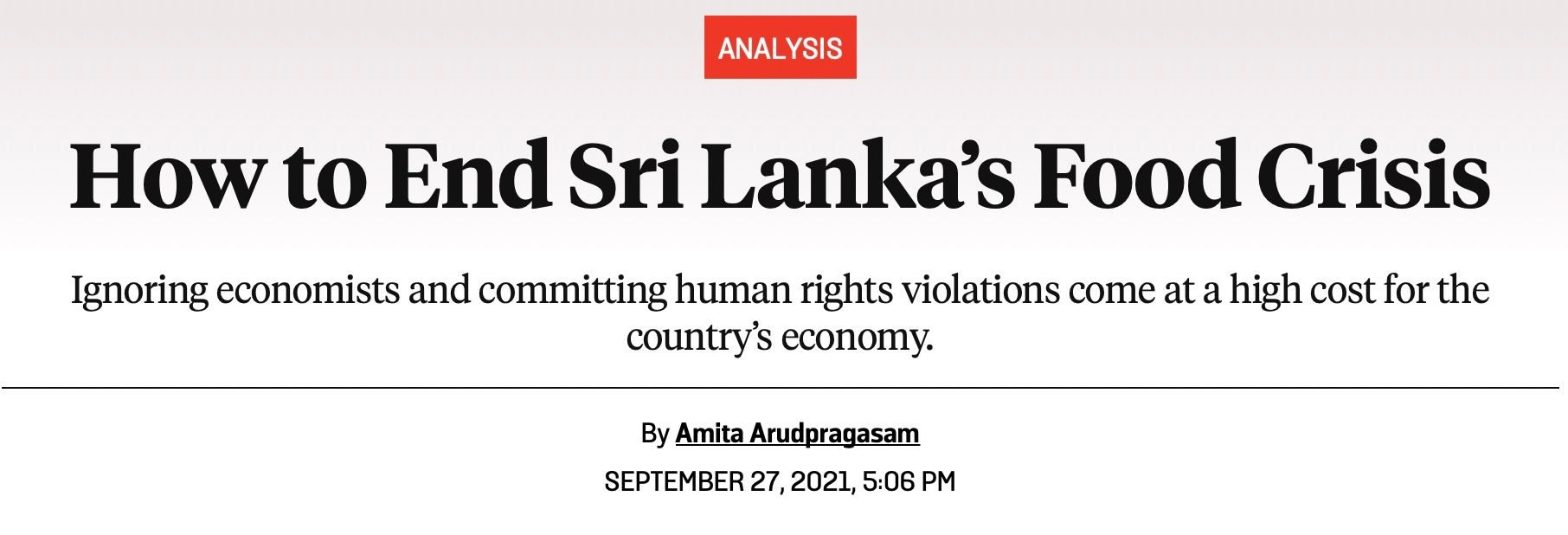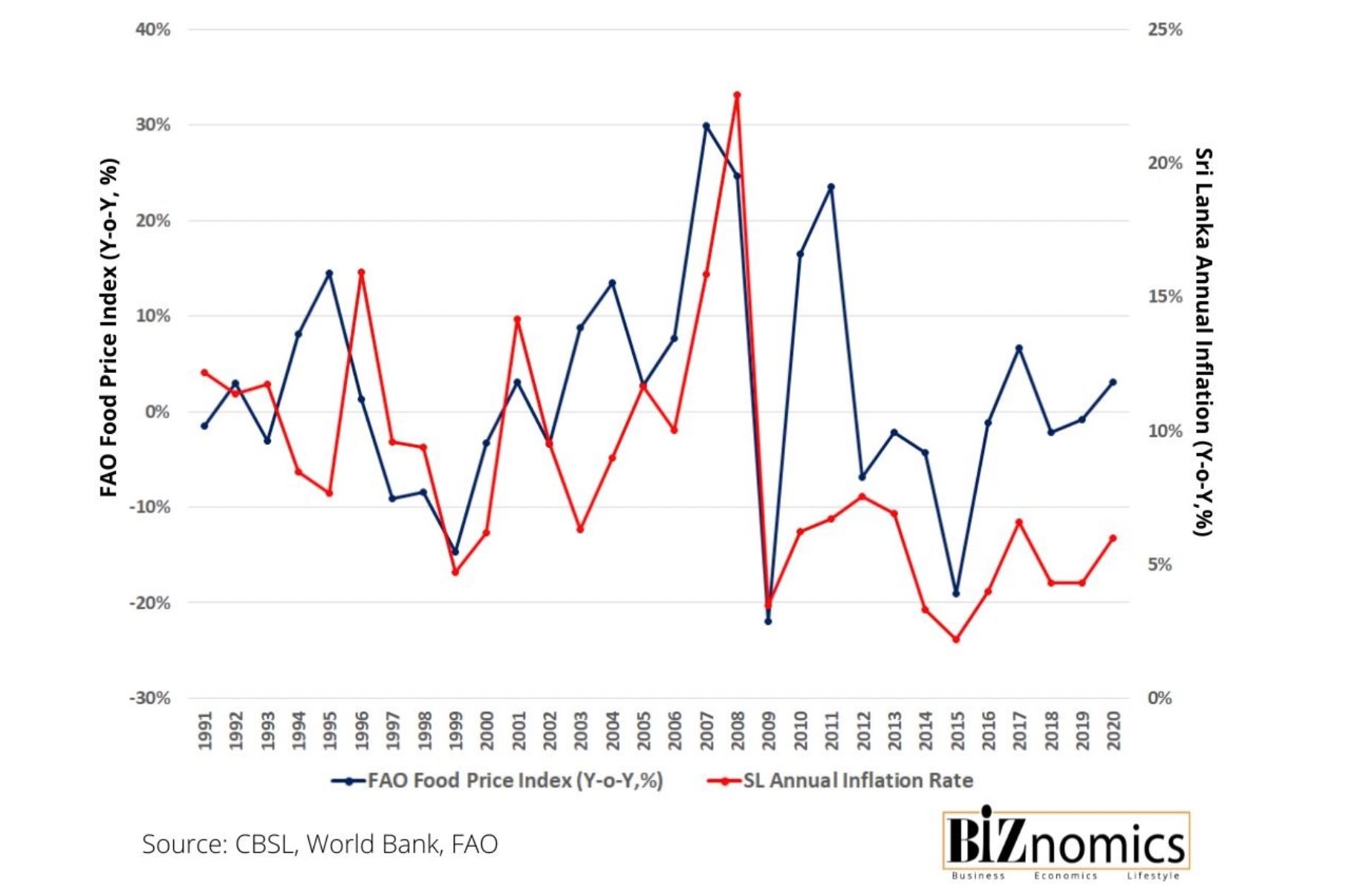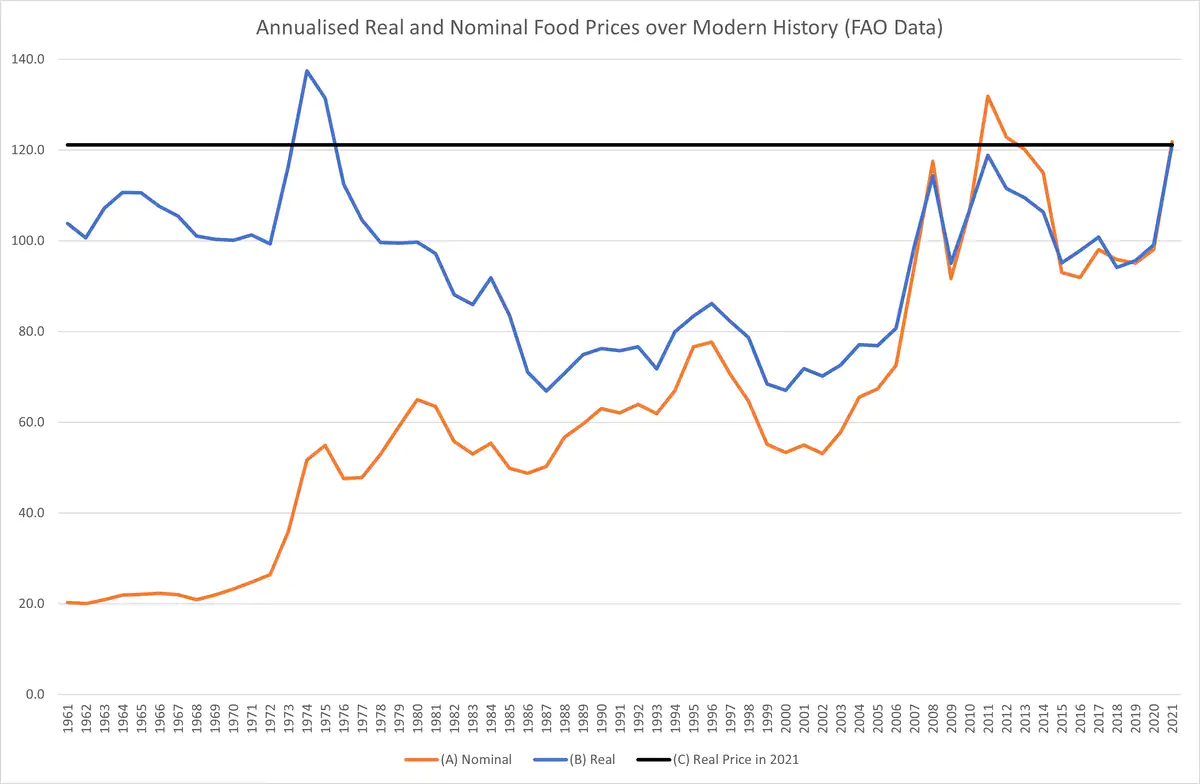How To Blame Poor Countries For A Food Crisis
Don't worry about capitalism collapsing, just look at these dumb darkies!
My friend Amita Arudpragasam wrote an article in Foreign Policy called How to End Sri Lanka’s Food Crisis. I know Amita and like her very much, but I'm afraid I must go hard here because the article is very wrong. I will attack the piece based on three core assumptions contained in the headline. Obviously read the whole thing yourself.
I'm also attacking the article and not her, I know her intentions are good, but this sort of publication unwittingly does the devil's work. It launders capitalism and dumps all the blame on random poor country. It ain't right.

The assumptions I'll attack are:
- This is a Sri Lankan food crisis
- Economists know how to end it
- Human rights something something
As I'll demonstrate, none of this is remotely true, except in the ignorant minds of Foreign Policy readers who just see an article about "shithole bad, West good 👍🏻" and move on. The truth is that we're in a global food crisis, one of many recurring crises, and this is not on Sri Lanka. These are all crises of capitalism itself.
They're trying to pin this all on some random poor country, prescribe more capitalism as the cure, and then somehow slap human rights on there so white people can feel superior. It's just wrong. This sort of incoherent analysis is no solution to the multiple crises we face. This arrogant ignorance is the problem.
1. Sri Lanka's Food Crisis
The first assumption of the article is in the title. It's called 'How to End Sri Lanka’s Food Crisis'. This implies that Sri Lanka has a unique food crisis and is not caught up in a global shitstorm. But there's a food crisis in many countries, almost everywhere except places like China.
Just look at the data:

It's not really "Sri Lanka's food crisis at all." It's a global food crisis and we're just experiencing it. The article attributes problems to Sri Lanka's deficiences, but it also "these deficiencies have existed for more than a decade." So what do they have to do with a global food crisis? It's like blaming cancer when someone gets hit by a bus.
Can we just move on and talk about the bigger capitalist problem affecting everybody, you know, the one also ending the world? Sadly, no. The whipping boy must get whipped. Bad Sri Lanka, bad.
FP says "challenging external conditions, however, do not exonerate Sri Lanka’s policymakers." So what are Sri Lankan policymakers guilty of?
Rajapaksa’s isolationism, unlike Bandaranaike’s in the 1970s, is shaped less by global economic events than by an aversion to the West and a cultivation of conservative support, which views international powers as a threat to Sri Lankan sovereignty.
So the charge is isolationism, and not liking the West enough. And today is also somehow unlike the 1970s because, I dunno. Just?
If you look at the data, however, it sure looks a lot like the 1970s:

Global food prices are the highest they've been since... the 1970s. The article says "Fifty years ago, Sri Lankan policymakers were also concerned about excessive international dependence—but understandably so." But they somehow can't understand a similar response to similar circumstances today.
FP can see similar policies but just chooses to deny similar causes. But this is dishonest.
Import restrictions are at their highest since the 1970s, when the country was nearly a closed economy. Analysts are now drawing comparisons to that decade, which is the last time Sri Lanka saw shortages of essentials like rice, bread, and sugar.
It's not like Rajapaksa campaigned on these policies, he ran as a pro-growth technocrat. But FP chalks it all up to his anti-western aversion without any proof. Our President was an American citizen until 2019 and just signed a controversial energy deal with a US fossil fuel company, but who cares? FP readers just want to read another story about some colored despot and feel good about themselves. It's a capitalist fairy tale about monsters in the jungle, so they can ignore the monsters they are.
So a crisis within capitalism itself becomes an isolated event in Sri Lanka. A repeating crisis becomes isolated in history. And capitalism avoids its own failures, by getting some random poor country to take the fall.
2. Neoliberal Nonsense
Do you know what the payoff of the article, the way to end a capitalist crisis? More capitalism. Neoliberalism is funny because it doesn't matter what's wrong with you, you always get the same medicine. More capitalism!
The big galaxy brain idea of the article is that the way out of a food crisis is to grow less food. We should make our farmers programmers. Seriously. 🤯
Rajapaksa is doing the opposite of what development economists generally recommend. According to experts, countries should move away from low-productivity sectors, such as agriculture, into high-productivity sectors, such as information and communications technology. Even though 30 percent of Sri Lanka’s labor force is employed in agriculture, the sector only contributes to about 8 percent of its GDP.
Great job guys. Once we somehow retrain like 20% of our population can they program up some rice? Who are these 'development economists' and WTF are they talking about? As Subramaniam and Kapur write,
Consider the Journal of Development Economics, a leading outlet for research papers in the field. Neither the journal’s editor nor any of its ten co-editors are based in a developing country. Just two of its 69 associate editors are, with Africa and Asia completely unrepresented .
Then there is the World Bank’s prestigious Annual Bank Conference on Development Economics (ABCDE).... none of the 77 participants were from an institution located in a developing country.
So basically a bunch of rich, mostly white people, deciding stuff at conferences that we can't even get visas to attend. And these guys are somehow smarter than anybody here, even while proposing obviously dumb shit like growing less food to fight a food crisis.
Amita said she's referencing southern economists, but I can't see any such insights here. It just sounds like she's infantilizing Sri Lankan farmers and patronizing the entire middle class.
Nonetheless, the government continues to subsidize and expand agriculture. As farmers struggle to educate and transition their relatives into higher wage jobs, Sri Lanka’s urban and middle classes romanticize the physical labor of the farmer, privileging the idea of “gama-pansala weva-dagaba” (“village temple, irrigation tank shrine”) or the village as the spiritual and productive heart of the nation.
Where do these broad assumptions even come from? Do all farmers hate their livelihoods? Is the entire middle class romanticizing farmers? How does Foreign Policy magazine have such privileged access to our thoughts and dreams? Should we abandon our village temples for these people that think they're God?
Then there's the hubris that a culture which values something else is just wrong and needs to be more productive. But we're not the ones melting the fucking Earth with our greed. Maybe western countries could learn something from the village.
Foreign Policy completely dismisses almost everyone in Sri Lanka because some distant economists have the answer, but they can't even remember the question. We were talking about how to end a food crisis, and they're talking about growing less food. It's nonsense.
3. Human Rights
The topping on this hubris sandwich is human rights, the secular religion of empire. Capitalism uses human rights the same way colonialism used Christianity, as an excuse to call us savages and abuse us. Hence you get the subheading of the Foreign Policy article:
Ignoring economists and committing human rights violations come at a high cost for the country’s economy.
Hmm.. what is that high cost? Some economic law, some natural consequence? Lol no, that's a threat. White people will impose costs on Sri Lanka. The EU will withdraw trade concessions from Sri Lanka, creating effective sanctions.
Now I'm a Sri Lankan human and our rights are damn important, but is this because white people will punish us? No. Fuck these people. These hypocrites developed by killing entire villages full of us, and they still think it's their place to discipline us through hardship. They can go to hell.
These colonizers have no right to punish entire civilian populations for what our leadership does to us. And yet they do this all over the world, collectively starving people for generations and saying it's for human rights. It's just another one of their many crimes against humanity.
The West is bombing Yemen into famine right now. They're freezing Afghanistan's money right now. They're besieging countries like Venezuela and Iran during a pandemic, right now. They're throwing migrants in concentration camps and actively drowning them at sea, also now. If the EU actually cared about human rights they'd sanction themselves.
These people were terrible Christians then and they're terrible for human rights now. They only worship money and all of their principles are for sale. If we Sri Lanka had any strategic interest or oil they'd happily sell us weapons and train our torturers themselves. These people do not give a fuck about human rights, it's all bullshit. It's just another way to whip people into capitalism.
Just look at what their recommendations are, what they want to fix. They don't give a fuck about whether we eat or not. They just want to make us easy pickings for capital:
Sri Lanka’s economic shortcomings are structural: a low tax-to-GDP ratio, prohibitive barriers to trade, a bloated public sector, and high costs of doing business.
What do these policies have to do with a food crisis? Squeezing the public, firing public servants, and pleasing investors doesn't put food on anyone's table. What does the food crisis have to do with human rights? Nothing, that's just so FP readers can feel superior, it's why they buy the magazine.
Do these people give a fuck about our food security? Lol no, their recommendation is less farming. Do they care about our human rights? Lol no, they support collective punishment for us all. Do they care about objective facts? Again lol no, their assumptions are beggared by data but they don't care.
The article is very wrong, but it doesn't matter. It confirms the biases of western readers and gaslights everyone in the south that global problems are all our fault. And that's precisely the point. The point is to look away from the capitalism and look at this savage island instead. But we must know better by now.
This isn't a Sri Lankan food crisis, it's a global crisis. This isn't a Sri Lankan failure, this is a failure of global capitalism. And this isn't about human rights, it's about capitalist hegemony. Our guys are jackasses, but they're not the ones causing this crisis, or the vaccine crisis, or climate crises. That's on powerful western elites, like the people that read Foreign Policy.